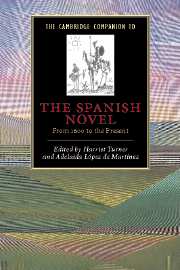Book contents
- Frontmatter
- 1 On the novel: mirror and text
- Part 1 Since Cervantes
- Part 2 The nineteenth century
- 4 The regional novel: evolution and consolation
- 5 The folletín: Spain looks to Europe
- 6 The realist novel
- 7 History and fiction
- 8 Gender and beyond: nineteenth-century Spanish women writers
- 9 Decadence and innovation in fin de siglo Spain
- Part 3 The twentieth century
- Bibliography
- Index
- Series List
4 - The regional novel: evolution and consolation
from Part 2 - The nineteenth century
Published online by Cambridge University Press: 28 May 2006
- Frontmatter
- 1 On the novel: mirror and text
- Part 1 Since Cervantes
- Part 2 The nineteenth century
- 4 The regional novel: evolution and consolation
- 5 The folletín: Spain looks to Europe
- 6 The realist novel
- 7 History and fiction
- 8 Gender and beyond: nineteenth-century Spanish women writers
- 9 Decadence and innovation in fin de siglo Spain
- Part 3 The twentieth century
- Bibliography
- Index
- Series List
Summary
For the intellectual historian of nineteenth-century Europe, certain words flag critical foci of interest: “revolution,”“evolution,” “nation,” “travel,” “industrialism.” These words are no less important in the literature of the period, and in Spain they have a particular relationship with the regional novel. Of these words, “evolution,” habitually associated with the ideas of Darwin, will be central to the discussion in this chapter. Common usage has accustomed us to apply it retrospectively and rather indiscriminately to areas of nineteenth-century life which, in their day, were innocent of such concepts. Yet the term “evolution” itself is one that has evolved. Coined by Haller in 1744, it initially indicated “preformationism,” the gradual unfolding of a form of life already perfectly formed. In the course of the nineteenth century, “evolution” came to have the force of “transmutation” with which we associate it today. Thus the shift was one from a consoling thought to achallenging one, from a position that maintained that change was, as it were,always and already foreseen, to the idea of evolution as a much more disturbingand challenging perspective, signaling that a change effected mightbecome something new. The evolving concept of the term “evolution” thusmoves from the idea of change as part of a pre-existing master plan (evolutionas development) to the idea of change as a process lacking linear certainty(evolution as variation).
- Type
- Chapter
- Information
- The Cambridge Companion to the Spanish NovelFrom 1600 to the Present, pp. 49 - 64Publisher: Cambridge University PressPrint publication year: 2003
- 1
- Cited by



